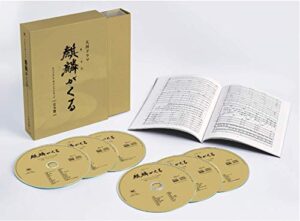曙光 / Descended from the Sun 収録OST: Vol.3 / 完全盤
この曲は他曲と異なる響きが必要でした。(この物語では象徴的な演出として)天皇が登場するのではなく、とても特別な役柄として描かれおり、一般的な時間の流れを超越した、大名、将軍や他の民とは異なる存在です
(日本神話を学んで天照大神の存在を知り)天皇と太陽に繋がりを感じたため、その特別な存在感を表現するにあたり、太陽の性質を音楽で表現する構想を考えました。「永劫性」「力強さ」「人類に対して無興味」「燦然とした輝き」「鼓動」「周期性」「眩さ」「燃焼する様子」などです。
興味深いことに、光秀が生きた時代のヨーロッパでは、太陽、月、惑星などの天体は、完全正確な周期と軌道で公転するな球体であることから「完全」な存在として考えられていました。その背景も考慮し、完璧な存在である太陽の音楽表現として、完全音程(完全8度、完全5度、完全4度)が旋律と伴奏で使用されています。(音楽的に調性を持たせないために)和音で3度は避けられています。
使用する楽器の構想として、時間軸の超越する様子、燦然と輝き、鼓動して、燃焼する様子の表現するために、人声と擦弦楽器を主に使用し、特に擦弦音(金属、硝子、他の楽器を弓で鳴らした音)の響きは「眩く」様子が表現されています。また、金管は、太陽が輝く様子、鼓動がある様子が表現されています。
主旋律はソロ歌手(堀澤麻衣子)が歌唱し、その周りに異なる距離感で合唱を配置することにより、天皇の周りに古代と現代の人々がいる様子が表現されています。
(太陽を用いた楽曲構想で)重要と感じた要素は、太陽が人類に対して無関心であることです(天皇が人に対して無関心という意味は無)。太陽は、人類に何が起ころうとも、何事もなく同じ場所で存在し続けます。太陽が持つ特別な存在感を考慮すると、そして天皇を演じる俳優(坂東玉三郎)の極めて高い演技力と素晴らしい台本を考慮すると、音楽はそのシーンの演出に対して、「悲壮感」や「高揚感」などの感情演出をする必要はないと考えました。その代わり、音楽の役割として「中立的で重要で力を持つ存在感」の表現が適切と考え、(音楽が不必要な感情演出を行わないことで)俳優が台本を元に本来の演技を行い(音楽も)効果的な演出ができると考えました。太陽は、人々の頭上にあり、圧倒的な存在感がありますが、人の勝ち負け、願い、運命には関心がありません。その俯瞰性と人類の行動に無関心な様子を、音楽的に表現するために、動の要素が少ない曲構想(ソロの主旋律を除いて)を行い、複数の楽器等が法則なく登場したり(太陽の熱と爆発性による混沌の表現の一部として)や明らかな鼓動感やリズムは避けることで表現されています。この曲は、状況の変化を演出することなく存在感を表現した曲であり、(この時代の)天皇が民の意識に有りながらも遠い場所に存在することが表現されています。
この曲は、まるで太陽のように、登場人物等の頭上で浮かぶ存在であり、希望、感情、願いとは接触しません。人々の世界を包みつつも、人々が必死に生きる世界の媒体であり、一定の距離がある存在であることが表現されています。
楽曲構成
この曲は鼓動なく始まり、わずかに輝きと共に始まり、まるで朝霧の日の出のようです。0’50箇所から、主旋律がガラスを弦で擦った音で奏でられます。この響きは、時間軸とは無関係に浮かんでいます。2’45箇所から、太陽が昇る様子が表現され、3’30箇所から、太陽の主旋律が堀澤麻衣子の美しい歌声によって歌唱されます。
6’03箇所から、金管と合唱によるクレッシェンド箇所があります。これは演出上に盛り上げたいことを考えて加えたものです。
(作曲をしていた時)「日の出」の瞬間は、天皇が登場する場面、もしくは微笑む場面なのでは、と想像していました。
This piece has to sound different from the rest of the score. Not only are we seeing the Emperor (or in his presence), but the Emperor’s role and rituals are supposed to be outside the ordinary; timeless, unaffected and uninfluenced by the daily struggles of daimyos, shoguns, and others.
Moreover, because of the Emperor’s association with the sun, I thought it would be appropriate for the music to evoke aspects of the sun. Accordingly, ideas like, “eternal,” “powerful,” “indifferent to humans,” “glowing,” “throbbing,” “cyclical,” and “dazzling” came to mind; even “sizzling.”
Interestingly, in Europe at the time of Mitsuhide, people believed that heavenly bodies (the sun, the moon, stars, the planets) were “perfect” – exactly spherical – and that they moved perfectly also, in exactly circular or spherical paths. That gave me the idea that the sun, if it had music, would sound ‘perfect,’ so I used perfect musical intervals (octaves, fifths and fourths) in the melody and accompaniment. I avoided thirds in the harmony.
For instruments, I thought we should try to evoke something timeless, but also sounds that glow, throb, or sizzle somewhat, so I primarily relied on voices and bowed instruments, especially bowed objects (bowed metal, bowed glass or bowed instruments) whose sound ‘glows.” I also used some brass, partly because they can “glow” and throb as well, a bit like the sun.
We have the solo singer to sing the main melody but choirs (some near, some far away) accompany her and create the sense of multitudes of people, maybe ancient and modern, supporting her and surrounding the Emperor’s person.
Finally, the sun is indifferent. It doesn’t care what happens to people but carries on in its place, unconcerned with humanity. For that reason, and also because I think we have superb actors and superb writing for these scenes, the music doesn’t ‘comment’ on what is happening; it doesn’t get “sad” or “exciting” or otherwise nudge the audience. Instead, the music creates a sensation of ‘something important and powerful’ but is unconcerned – this allows the actors to do what they do so well, with our amazing writer’s words. The sun is above the people, surrounds them with its presence, but actually doesn’t care who wins, who loses, or anything else to do with human wishes and fate. Musically, that objectivity and lack of concern expresses itself by being somewhat “still” (apart from the solo melody), by having entrances cross each other without being extremely ordered (to reflect a certain chaos in the sun’s heat and explosiveness) and avoiding a noticeable pulse or rhythm. The music is more a presence that evolves, much as the Emperor is a distant presence of which people are conscious but with whom very few actually consort.
Overall, like the sun, the music floats above the people in the story and doesn’t enter into their concerns, hopes, feelings, or wishes. Instead, it surrounds them and is part of the medium in which they struggle, but it remains apart.
Musical Progression
The cue starts off with no pulse, just a little glow, maybe on a misty morning before sunrise. Then, about 0’50” you can just discern the melody entering played on bowed glass. This floats along, without any hurry, taking its time. At approximately 2’45” the sun rises, and after that (at 3’30”) we hear the melody of the sun in the beautiful voice of Maiko Horisawa.
I added a crescendo at the end (6’03”) in the brass and choir in case the scene requires something more powerful than just the melody finishing.
With regard to the story, the “sunrise” moment could be the time when we actually see the Emperor, or perhaps when (if?) he smiles.
♫ ダウンロード&ストリーミング配信
「曙光 / Descended from the Sun」
from サウンドトラック Vol.3
※ NEXT COMPOSER NOTES
「信長 / Nobunaga」
アルバム
NHK大河ドラマ「麒麟がくる」オリジナル・サウンドトラック Vol.3
[発売日] : 2020.12.23
¥3,000+ 税
ソニー・ミュージックレーベルズ / SICX-30089
アルバム
NHK大河ドラマ「麒麟がくる」オリジナル・サウンドトラック 完全盤
[発売日] : 2021.02.24
¥15,000+ 税
ソニー・ミュージックレーベルズ / SICX-30090 ~ SICX-30095


